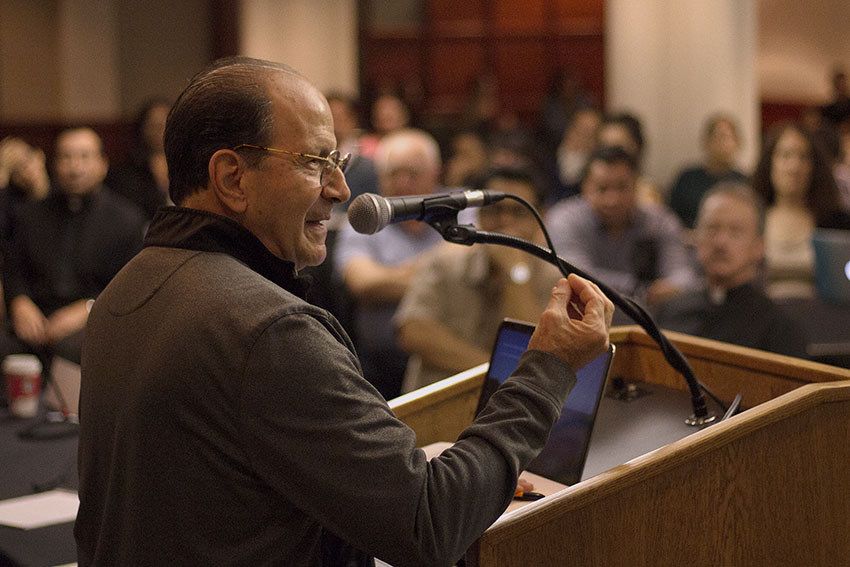Editor’s Note: This interview was originally conducted in Spanish.
For more than a decade, Alejandro Solalinde has been fighting human trafficking and abuses against migrants. He is the founder of the famous Hermanos en el Camino shelter for migrants entering Mexico from Central and South America, as well as Asia and Africa. On Wednesday, the renowned human rights activist and Catholic priest came to UT as part of the Austin Lecture on Contemporary Mexico to discuss his life’s work, hopes for the future and thoughts on the newly-released report by the UT Human Rights Clinic on human rights abuses in Coahuila, Mexico. The Daily Texan caught up with him before his speech.
Daily Texan: How would you describe your line of work?
Alejandro Solalinde: Entering my senior citizen years, I had the opportunity to experience an intense, historic adventure but also a terrible and encouraging journey with migrants. It consists of defending the human rights of migrants from everywhere, but especially Central and South America, focusing mainly in the Triangulo Norte. It is a population that is exposed, vulnerable, and though there are many obstacles in the journey, they continue moving north. There is something that moves them, that allows them to continue. My job is to accompany them on this journey, (to) try to understand them and tell the world what I am seeing and hearing from the migrants.
DT: What advice would you give a student who wants to work in this field of human rights?
AS: The world of immigration is fascinating! Working with migrants today goes well with the youth lifestyle because it is an adventure. It requires a lot of adrenaline to get on the metaphorical train of immigration and understand what is happening to this part of the population world-wide, because it is a world-wide issue. It is important because migrants are the epicenter of change in the world. They are denouncing the world that we left behind. They are the personification of today’s reality as targets of humanity’s violence, but also a vision of hope because they are working towards a world that we have yet to see—that Europe and the U.S. have yet to create.
DT: What is your opinion concerning the report that was released from the Human Rights Clinic at UT Law on the abuses of human rights in Coahuila, Mexico?
AS: It has been of the most important and brave works they have released. I think it was time to release that information because today it is protected. If they had released it six or seven years ago, their lives might have been in danger, wherever they may have been, because the Zetas were in 20 states in Mexico (and) they were in six, seven, eight states in the United States. It is an example of what we have to do in everything else because it is a restricted report concerning the state of Coahuila, some information on Veracruz, and we can almost say that it is restricted to local victims but it almost doesn’t mention migrants. We need to do a bigger report that refers
to migrants.
DT: Where do you find your strength to continue with this fight, regardless of fear?
AS: The word of the Lord says, in love there is no fear. When one loves, one does not fear. Even if you are 100 percent conscious of what you are exposing yourself to, you can’t do anything else because the last thing you are thinking about is yourself, but instead about others. If you stay silent, others will die, suffer. My strength is Jesus and the Holy Spirit, those are my two friends that have held me up, pushed me forward, taught me the way. I work for and with them, and I serve them. Everything else doesn’t matter to me because my life is not in the hands of the criminals, the government, organized crime or authorized crime. My life is in the hands of God, and because of that I am peaceful.
DT: Have you ever felt fearful during any of your encounters?
AS: Of course, I am human. I have felt sadness, anger, pain, fear. There has been several times I have thought of this fear as a pre-death because you know you are about to die, it is about to be your last day. I have felt that several times, especially when I put in 4 accusations against Zeta cartel members for the kidnapping of 50 migrants in Chahuites. The Mexican government said ‘If father Solalinde doesn’t press charges, we can’t do anything about it.’ I knew if I did I would be singing my death sentence, but I did it anyways. I put in my side of the deal and then the Mexican government did nothing, absolutely nothing.





















